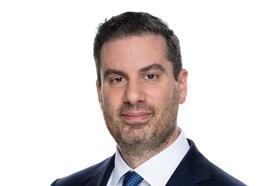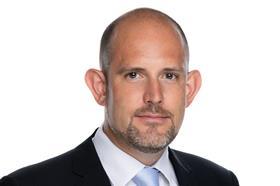When we decided to launch a start-up specialist disputes and insolvency law firm based in Central London, we knew there would be challenges. We had both departed the relative security of equity partner roles in established firms: we were, respectively a partner in a mid-sized regional firm (Luke) and a partner in an established City of London disputes boutique, co-founded back in January 2009, in the wake of the last financial crisis (Marc).


Neither of us expected, however, that a short time before the launch of Keidan Harrison LLP, the world would be hit by a pandemic.
The firm follows in a strong tradition of London-based disputes-focussed boutiques, with a focus on high value corporate, commercial and financial mandates – including both litigation and arbitration – as well as substantial civil fraud and insolvency work.
Undisputedly different
Prior to launching the firm we had already decided to break with convention and challenge the norm. When our branding consultant, Nick Petit of Blackbird Brands, suggested the firm use the strap line 'undisputedly different' we were initially sceptical and wondered if it was just marketing speak, but having been asked to sleep on it and come up with the things that would make us undisputedly different, it became a fundamental brand and cultural value. The five core values we came up with being: free of conflicts of interest, innovative, bold, dynamic and value-driven.
Rapid growth
The firm has expanded rapidly since it opened its virtual doors on 1 May 2020. At the start us founding partners were joined by associate Laura Coad and office manager Hannah Durkan with whom they had each respectively worked at their former firms. A further associate was sought swiftly and that vacancy was filled by former DLA and Memery Crystal associate Kit Smith. The firm later recruited tri-qualified (India, New York and England and Wales) associate Srishti Jain (January 2021) and boutique firm-trained associate Alex Akin (April 2021). All recruitment was undertaken organically without agents, making use of social media and with the firm particularly interested in inquisitive and entrepreneurial associates who had the nous to apply directly. A new partner, Dipti Hunter, joined from PwC’s commercial disputes team in May. We have also just recruited two paralegals and two NQs who join between August and September taking the number of fee earners to 11 with nine qualified.
Community engagement during the pandemic
Social media, and in particular LinkedIn, has played a significant part not only in the firm’s recruitment but also in establishing profile. The firm and partners have a substantial number of connections on LinkedIn allowing us to contribute to a fertile community of professional intermediaries including other lawyers. Referrals, and in particular referrals from fellow disputes lawyers, have been the largest source of work for the firm. Adding value, therefore, to that community has been fundamental to the firm’s business development and profile-raising strategy.
The pandemic has naturally posed challenges when it comes to business development, and we both very much miss the in-person professional networking circuit that thrives in London in normal times. The firm sought to adapt rapidly to the changed circumstances and sought to ensure that it was plugged into the associations and communities of the insolvency and disputes profession, both domestically and internationally. The newly launched Thought Leaders 4 FIRE and Thought Leaders 4 Disputes communities, with which the firm has agreed a commercial partnership, are prime examples of communities which have prospered in the virtual world and which will, post pandemic, continue to operate as a cohesive group of like-minded professionals. In addition, the firm, through its contribution to the programme committee, has been actively involved in helping to coordinate the second annual London International Disputes Week and co-hosting a session on shareholder disputes with Quadrant Chambers, which has been the firm’s single busiest practice area since opening. It was perhaps not surprising, therefore, that over 400 people from a number of jurisdictions around the world attended the virtual event putting it in the top 5 of over 80 LIDW events held that week. The pandemic has only reinforced the need for engagement with the professional community.
Harnessing technology has been key
The firm’s plan had always been to operate in a substantially paperless manner, for efficiency and environmental reasons - but the pandemic meant this wasn’t merely something to aim for; it was necessary. Upon launch, two applications were selected to support the digital strategy. Clio, the firm’s practice management system and Hyperlaw, for case preparation and presentation. The firm also has an entirely cloud based infrastructure, meaning almost no down time, low operating costs and a responsive system for users. Software is supported with state-of-the-art hardware. All team members are issued with Microsoft Surface Pros or Surface Books. The in-office hardware comprises 23” dual HP monitors on Humanscale monitor arms connected to user’s hardware via Microsoft Surface Docks allowing users to select between portrait and landscape set ups
Harnessing the flexibility of outsourcing
The firm has strategically outsourced all non-core services and has high-spec serviced offices with flexible office provider Beaumont, at 44 Southampton Buildings, London. This approach allows for growth without having to carry high fixed costs. The offices also provide a high-quality client facing experience, with a comfortable client coffee lounge and well equipped meeting rooms which include video conferencing. The finance team comprises specialist legal outsourcing firm Quill and a fractional finance director, Nicholas Sterne (ex PwC) of Sterne Management Advisory. The firm’s virtual IT support is provided by Lumina Technologies, who have a focus on law firms and provide a fully managed service.
Building a team in a pandemic
Perhaps the greatest challenge has been to bind together a new and young team, some of whom have been recruited remotely. Making use of Microsoft Teams, the firm has a voluntary morning drop in call which, with our small numbers of staff, works surprisingly well and has, at intervals between lockdowns, permitted associates to work from the office where they considered this to be necessary. The firm believes strongly in the value of in-person interaction within an office environment, particularly for junior staff. Accordingly, the firm expects in the coming months to generally operate a 3-4 day per week hot desking approach, with staff otherwise working remotely.
The associate package
In the winter of 2020, the firm undertook a consultation with associates to enable them to help to design their own package. Launched in May 2021 the associate package comprises a base renumeration, a bonus linked directly to fee income and an additional bonus based on non-fee earning performance. The latter comprises quality of work, client service, business development, teamwork and financial and risk management. The firm has set aside 10% of the firm’s profits (after equity partner revenue contribution) for bonus purposes, aligning all staff with the financial success of the firm. These are also the KPI’s against associates are appraised. The firm sees no need to operate chargeable hours targets. Associates are also able to request, in addition to their 25 days holiday, up to 10 days of additional leave which could be for childcare, travel or some other reasons, recognising that one size does not fit all. Further, the firm will additionally consider permitting associates to work remotely from abroad for periods, on a case by case basis. The approach to flexibility is functional.
Encouraging client engagements
The firm has had the good fortune to be instructed on some impressive mandates in its first year, the vast majority of which involved being instructed by entirely new clients, in most cases generously referred to us by our professional friends and network. One of its first substantial mandates was, in the summer of 2020, to be engaged by a party involved in a corporate dispute relating to FTSE 250 listed miner, Petropavlovsk PLC. It has also received a mandate in the Tonstate Group litigation (involving a company which had circa £1bn of assets), a pandemic-facilitated fraud and asset recovery claim for lender MSP Capital Plc and the defence of an office holder claim for Taking the Initiative Party co-founder and music mogul Charles Gordon, amongst other high-quality instructions. It is only right to acknowledge that the firm has benefitted from substantial support both from clients and its professional network, in London and internationally, and we will always be extremely grateful to those – too many to mention who generously went out of their way to help us through a challenging, if also ultimately successful, first year.
What does the future hold?
The firm has recently celebrated its first birthday and as co-founding partners we have our sights set on sustained but managed growth, built on solid cultural foundations and a value exchange with both the internal team and the firm’s client and intermediary base. The firm continues to be a strong advocate of the use of third-party disputes funding, with a number of strong existing relationships in that field, and is also looking to take on more cases with innovative funding structures, including on damages based agreements where the case is suitable. The firm will continue to disrupt convention where appropriate and is committed to being a law firm fit for the present but with an eye on the future.
Marc Keidan and Luke Harrison, Keidan Harrison LLP




























2 Readers' comments